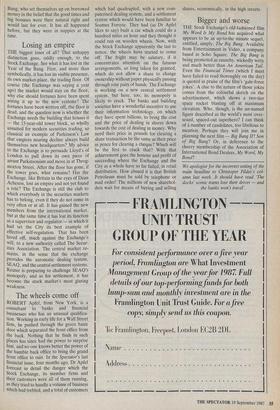The wheels come off
ROBERT Apfel, from New York, is a consultant to banks and financial businesses who has an unusual qualifica- tion. Working in early life for a Wall Street firm, he pushed through the green baize door which separated the front office from the back. Nothing that he finds in such places has since had the power to surprise him, and no one knows better the power of the humble back office to bring the grand front office to ruin. In the Spectator's last financial issue, four months ago, Dr Apfel forecast in detail the danger which the Stock Exchange, its member firms and their customers were all of them running, as they tried to handle a volume of business which had trebled, and a total of customers
which had quadrupled, with a new corn- puterised dealing system, and a settlement system which would have been familiar to Soames Forsyte. They had (as Dr Apfel likes to say) built a car which could do a hundred miles an hour and they thought it could run on wooden wheels. Now, with the Stock Exchange apparently the last to notice, the wheels have started to come off. The fright may be salutary, if it concentrates attention on the fatuous arrangements, so long taken for granted, which do not allow a share to change ownership without paper physically passing through nine pairs of hands. The Exchange is working on a new central settlement system, but here, too, its monopoly is likely to crack. The banks and building societies have a wonderful incentive to use their information technology, on which they have spent billions, to bring the cost and the price of dealing in shares down towards the cost of dealing in money. Why need their price in pounds for clearing a share transaction be the same as their price in pence for clearing a cheque? Which will be the first to crack that? With that achievement goes the honour and profit of succeeding where the Exchange and the City as a whole have so far failed, in retail distribution. How absurd it is that British Petroleum must be sold by telephone or mail order! The millions of new sharehol- ders wait for means of buying and selling shares, economically, in the high streets.


































































 Previous page
Previous page